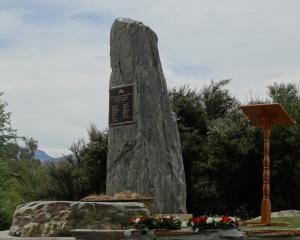At 7 p.m. the doors were opened, and in a quarter of an hour the hall was packed to the doors, the gallery being also filled.
By half-past 7 crowds were wedged in a dense mass at the back of the hall, which was hung around with bunting, the flags of the British allies being prominent, as well as the Union Jack.
A good deal of enthusiasm was shown by those present, especially by those towards the back of the hall, who waved flags and cheered themselves hoarse during the interval of waiting for the proceedings to begin.
The National Anthem (''God Save the King'') had a good run, and a less respectful, but quite sincere expression of emotion, ''King George He Was'', kept up the spirits of the audience, who expressed a fervent desire to ''hang Kaiser Bill on a sour apple tree''.
Those coming in were met by ushers, who directed those desirous of enrolling in the reserve to a small room.
Here they were required to sign a paper containing the following declaration: -- ''I, the above-named --, apply to be enrolled in the New Zealand National Reserve Force, Otago district, and I declare the particulars above written are true, and that I will loyally do my utmost to promote the objects of the National Reserve.''
Intending members were required to give their names, ages, and addresses, and particulars of any service or training which they had done.
A fee of 2s was paid by each man, who then received a badge with the words ''National Reserve'' upon it in gold lettering.
There was a steady trickle of men into the room all night, and the intending entrants were of all ages, from youths to middle-aged men, and of all classes, from the labouring to the business and professional.
Clergy were also amongst the entrants.
Altogether, 360 enrolled at the hall, and 180 have reserved at the office during the last two or three days, and the roll is now well over 1000.
Numbers of these wish to go to the front.
Some time before 8 o'clock the doors were closed, and a huge crowd of several thousands gathered in Dowling street.
A large number of these went to an overflow meeting in the Early Settlers' Hall, and a very large proportion remained patiently outside the Garrison Hall.
A huge crowd collected in Dowling street when the audience had quietly left the hall, and, after a few minutes of waiting, and cheering madly, bits of bunting stuck on the end of Territorial rifles, rushed down to Cumberland street, where the members of the National Reserve were drawn up.
Headed by the Kaikorai Band, the reserve men, with a huge crowd of citizens, marched, amid great enthusiasm, along High street to Princes street, and on as far as the Octagon, where they turned, and marched back to Dowling street.
Here the majority of the crowd melted away, but a large number of young men expended their enthusiasm in a noisy parading of the streets till a late hour.
The original procession itself was a most impressive sight, and was marked by great patriotic fervour on the part of those who accompanied or were in it.
Owing to the Garrison Hall being unable to hold the large numbers which assembled, the Dunedin Municipal Association abandoned its meeting in order that a second patriotic meeting might be held in the Early Settlers' Hall.
Practically the same programme was rendered, the speakers at the Garrison Hall also addressing the crowded audience, which filled the building to overflowing. - ODT, 7.8.1914.

